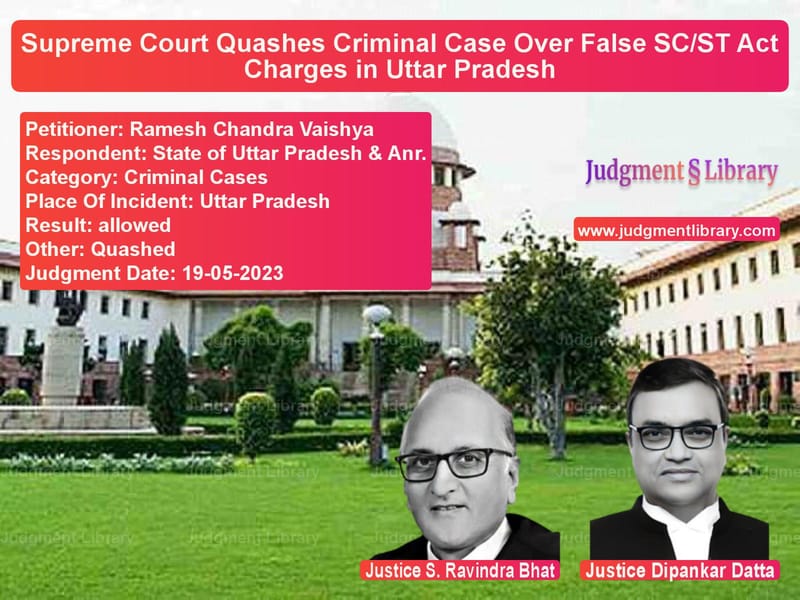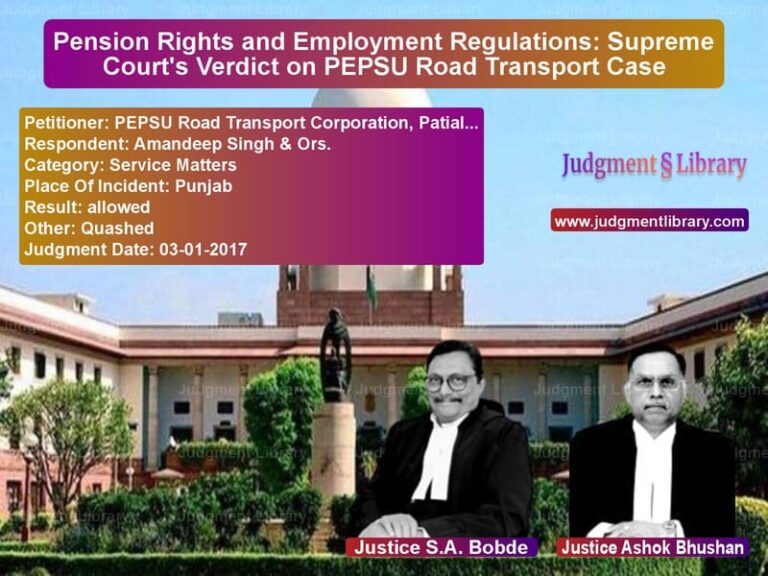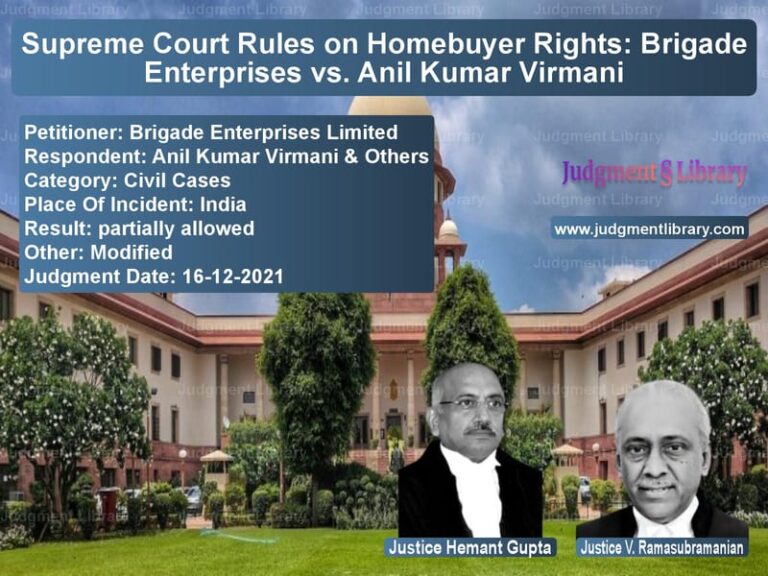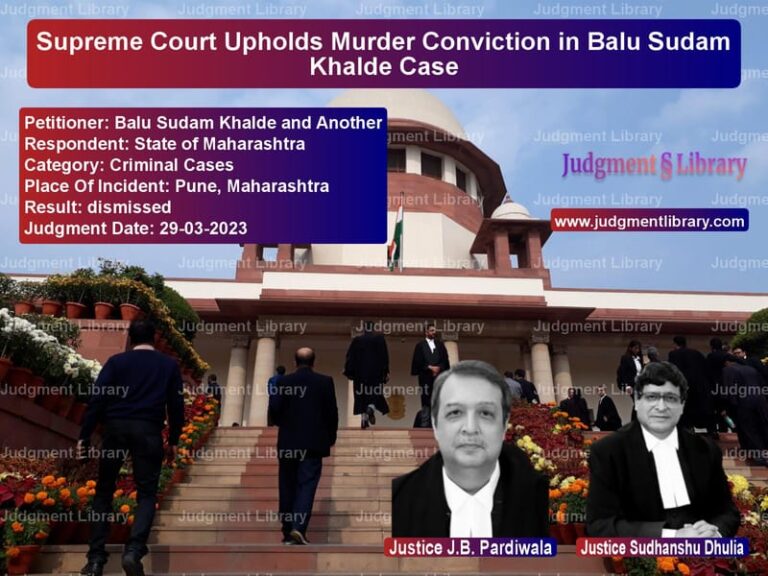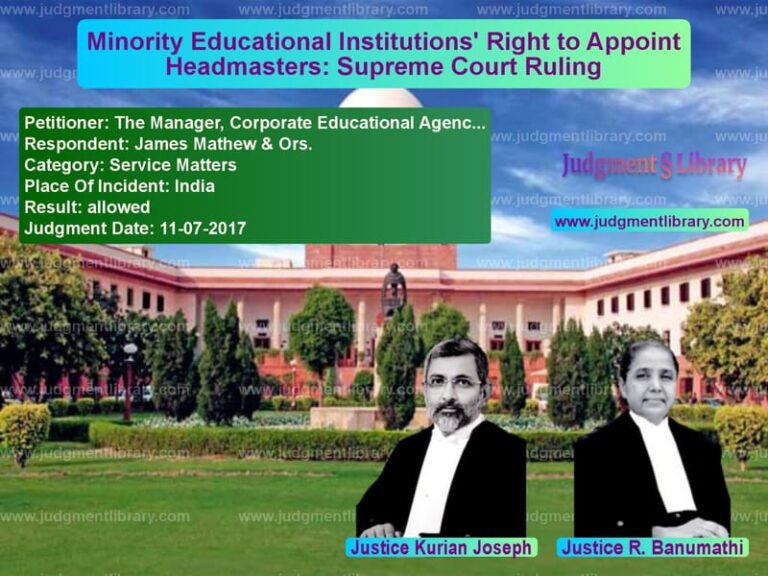Supreme Court Quashes Criminal Case Over False SC/ST Act Charges in Uttar Pradesh
The Supreme Court of India has recently ruled on a case involving allegations under the Scheduled Castes and Scheduled Tribes (Prevention of Atrocities) Act, 1989 (SC/ST Act) and related sections of the Indian Penal Code (IPC). The case of Ramesh Chandra Vaishya v. State of Uttar Pradesh & Anr. involved accusations of caste-based abuses and physical assault, with the appellant seeking to quash the charge-sheet and criminal proceedings against him. The Supreme Court set aside the High Court’s decision and ruled that the case against the appellant was an abuse of the legal process.
Background of the Case
The incident occurred on January 14, 2016, when an altercation arose between the appellant Ramesh Chandra Vaishya and the complainant (second respondent) over the issue of water drainage. The complainant alleged that the appellant:
Read also: https://judgmentlibrary.com/supreme-court-grants-probation-in-gambling-conviction-case/
- Verbally hurled caste-related abuses at him and his family.
- Physically assaulted him, causing multiple injuries.
Based on these allegations, an FIR was registered on January 20, 2016, under the following sections:
- Section 323 IPC (voluntarily causing hurt).
- Section 504 IPC (intentional insult to provoke breach of peace).
- Section 3(1)(x) SC/ST Act (intentionally insulting or intimidating a Scheduled Caste member in a public place).
The police conducted an investigation and filed a charge-sheet the very next day on January 21, 2016, before the trial court, which took cognizance of the case on May 3, 2016.
Appellant’s Counter Allegations
The appellant, however, claimed that:
- He was the real victim, having been attacked by the complainant and his son with canes and lathis.
- His attempt to file an FIR on the same day was ignored by the police, and instead, he was detained and later released on bail.
- He was forced to approach the Magistrate under Section 156(3) CrPC, which resulted in the registration of a second FIR on February 18, 2016, against the complainant under:
- Section 323 IPC (voluntarily causing hurt).
- Section 325 IPC (grievous hurt).
- Section 392 IPC (robbery).
- Section 452 IPC (house trespass after preparation for assault).
- Section 504 IPC (intentional insult to provoke breach of peace).
- Section 506 IPC (criminal intimidation).
The appellant also filed a civil suit seeking an injunction against the complainant’s alleged encroachment on his land, further complicating the case.
Legal Battle in the High Court
The appellant filed a petition in the Allahabad High Court under Section 482 CrPC, seeking to quash the charge-sheet and the criminal proceedings on the grounds that:
- The FIR was filed six days after the alleged incident, raising suspicion of an afterthought.
- The charge-sheet was filed hastily within a day, without proper investigation.
- The complainant, being influential, manipulated the police to frame him.
- His complaint was deliberately ignored by the police.
- The charges under the SC/ST Act were fabricated to settle a civil dispute.
The High Court, however, dismissed the petition on May 23, 2022, ruling that:
- It was not the stage to evaluate the merits of the allegations.
- There was no procedural irregularity in the charge-sheet.
- The case should proceed to trial.
Supreme Court’s Observations and Ruling
The Supreme Court, hearing the appeal, made the following key observations:
1. Failure to Meet Requirements of SC/ST Act:
- Section 3(1)(x) of the SC/ST Act requires that caste-based insults occur in a public place and be targeted specifically at the victim’s caste.
- The first FIR did not mention where the abuse took place or whether any member of the public witnessed it.
- The second FIR, filed by the appellant, indicated that the incident occurred at his private residence, making it ineligible for prosecution under the SC/ST Act.
- Since no independent witness was mentioned in the charge-sheet, the caste abuse allegation was not substantiated.
2. Absence of Specific Caste-Based Remarks:
- The FIR and charge-sheet did not specify the exact words used by the appellant that would constitute caste-based abuse.
- Simply insulting someone who belongs to a Scheduled Caste does not automatically attract charges under the SC/ST Act unless the insult specifically targets their caste.
3. Flawed Investigation and Selective Action by Police:
- The police filed a charge-sheet against the appellant in just one day but failed to act on his complaint until ordered by the Magistrate.
- No medical report was included to prove the injuries of the complainant, while the appellant had medical records of his own injuries.
4. Abuse of Process and Political Motivation:
- The Supreme Court cited the ruling in State of Haryana v. Bhajan Lal, which allows quashing of FIRs filed with an ulterior motive.
- It also referenced Hitesh Verma v. State of Uttarakhand, where it was held that caste-based insults must be explicitly mentioned in the FIR.
- The Court held that the case was a clear misuse of the SC/ST Act for political and personal gains.
Final Judgment
In its ruling, the Supreme Court:
- Quashed the charge-sheet and criminal proceedings against the appellant.
- Set aside the Allahabad High Court’s decision.
- Held that allowing the trial to proceed would amount to an abuse of the legal process.
Key Takeaways from the Judgment
- For an SC/ST Act charge to stand, caste-based insults must be specifically directed at a person’s caste and occur in a public place.
- Mere verbal abuse, without reference to caste, does not attract Section 3(1)(x) of the SC/ST Act.
- A delayed FIR, coupled with a flawed investigation, can indicate malafide intent and manipulation.
- The Supreme Court reaffirmed that criminal proceedings cannot be used as a tool for harassment in civil disputes.
Conclusion
The Supreme Court’s ruling in Ramesh Chandra Vaishya v. State of Uttar Pradesh serves as an essential precedent against the misuse of the SC/ST Act. It highlights the importance of thorough investigation, the need for explicit caste-related remarks to attract SC/ST Act provisions, and the role of courts in preventing abuse of legal provisions for personal or political gains. This judgment reinforces the principle that justice must be based on concrete evidence, not mere allegations.
Petitioner Name: Ramesh Chandra Vaishya.Respondent Name: State of Uttar Pradesh & Anr..Judgment By: Justice S. Ravindra Bhat, Justice Dipankar Datta.Place Of Incident: Uttar Pradesh.Judgment Date: 19-05-2023.
Don’t miss out on the full details! Download the complete judgment in PDF format below and gain valuable insights instantly!
Download Judgment: ramesh-chandra-vaish-vs-state-of-uttar-prade-supreme-court-of-india-judgment-dated-19-05-2023.pdf
Directly Download Judgment: Directly download this Judgment
See all petitions in SC/ST Act Case
See all petitions in Bail and Anticipatory Bail
See all petitions in Fraud and Forgery
See all petitions in Judgment by S Ravindra Bhat
See all petitions in Judgment by Dipankar Datta
See all petitions in allowed
See all petitions in Quashed
See all petitions in supreme court of India judgments May 2023
See all petitions in 2023 judgments
See all posts in Criminal Cases Category
See all allowed petitions in Criminal Cases Category
See all Dismissed petitions in Criminal Cases Category
See all partially allowed petitions in Criminal Cases Category

